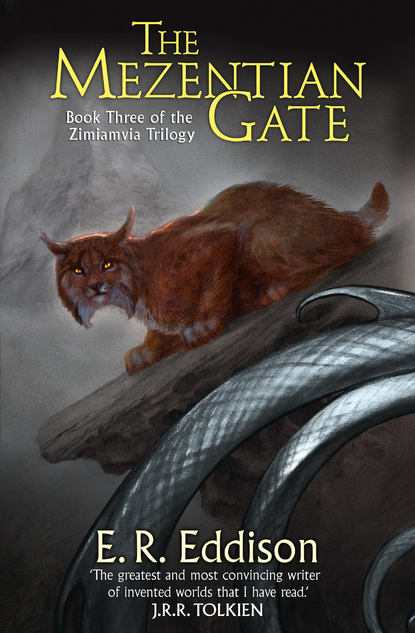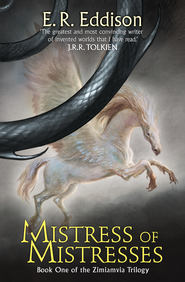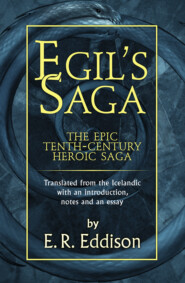По всем вопросам обращайтесь на: info@litportal.ru
(©) 2003-2024.
✖
The Mezentian Gate
Автор
Год написания книги
2019
Настройки чтения
Размер шрифта
Высота строк
Поля
There was no answer. Supervius looked at the ceiling. ‘You are a harsh stepfather, when his own people would have him back, to wish to put him out again; and with our help, God save the mark!’ Emmius raised an eyebrow, then fell to tracing with his pen-point little jags and stars on the paper before him. Keriones repeated his question. ‘Briefly so,’ said Supervius, and thrust out his jaw.
‘Will you stand upon that, my Lord Emmius Parry?’ said the prince. And, upon Emmius’s shrugging his shoulders and saying, ‘At least it conveniently brings us back to a base on which we can, maybe, by further debate frame some mean toward agreement’, ‘Then,’ said the prince, gathering up his papers, ‘our work is but waste work, for we will not for our part any longer endure this thing.’
Supervius opened his mouth for some damageful rejoinder, but his brother, checking him with a hand upon his arm, made for both: ‘I pray you yet have patience awhile. Nor I nor my brother desire troubles in the land. But if, spite of that, troubles be raised, we are not unprepared; men may wisely beware how they stamp upon our peaceful stockinged feet, be it in the north there or nigher home.’
‘You think to cow us,’ said Keriones violently, ‘with threats of war? seeing that by fraud, art and guile you can no further? But you shall find that neither are we unprepared. Neither are we without friends to fight beside us, if needs must, in our just quarrel. Yea, friends right high and doubtable: out of Fingiswold, if you goad us to that. We will call in King Mardanus to aid us.’
There was a silence. One or two startled as if a rock had fallen from the sky. The Lord Emmius smiled, drumming delicately on the table with his fingers. ‘Our words, of both sides,’ he said at last, ‘out-gallop our thoughts: sign we are hungry. These be not matters to be swept up in a rage, as boys end a game of marbles. Let’s dine and forget ’em awhile. Then, with minds refreshed, chance our invention may devise a picture shall please us all.’
Kresander said beneath his breath, but Supervius, as catching the sense of it, reddened to the ears, ‘He that shaketh hands with a Parry, let him count the fingers a receiveth back again.’
But Keriones, his brow clearing (as though that rude discourtesy, contrariwise to its sense and purpose, wrought in him but to second Emmius’s pleasant words and with potenter force than theirs), said to Emmius, ‘You have counselled well, my lord. Truly, he that will argue matters of state on an empty belly hath his guts in his brains.’
While they waited for dinner, there were brought in spice-plates and wines. Emmius said, ‘I pray you do me that favour as to taste this wine. I brought it north on purpose for our entertainment. It is of Meszria, of their famousest vintage: a golden wine of Armash.’ With his own hand he filled round the goblets from the jewelled silver flagon. ‘Prince Kresander, I’ll pledge you first: I know not why, unless ’tis because you and I have, of all of us, journeyed farthest to this meeting-place.’ With that, he drained his cup: ‘To our soon agreement.’ Kresander, flushing in the face with an awkward look, drained his. And now, carousing deep healths, the whole company pledged one another.
They dined lightly on what the inn afforded: capon, neats’ tongues, bacon pies, sallets, and round white cheeses pressed in the hill-farms above Killary. These things, with much quaffing down of wine, soon warmed them to quips and merriment, so that, dinner being done, they came again, with minds cleared and blood cooled, to their chief matter subject.
‘Ere we begin,’ said Emmius, ‘I would say but this. With what intent came we to this place, if not to seek agreement? Yet we spent the morning upon a dozen prickly questions, most of them not worth the reward paid to a courtesan for a night’s lodging, and yet each enough by itself to stir up the gall of some or other of us and set us by the ears. How were it now if we set about it another way: talk first on those matters whereon we are at one? And, most worth of all, this: that we will have no foreign hand meddling in Rerek. That is an old tried maxim, profitably observed by us in all our private differences whatsoever, and by our fathers, and fathers’ fathers.’
‘Your lordship has well and truly said,’ said Kresander; ‘as myself, most of all, should feel the mischief, were outlanders to come in upon us from that quarter. So much the more, then, behoveth some not to bring things to that pass that others may think it a less evil to fetch in help from without than to abide the injustices put upon them within the land.’
Emmius said, ‘Our private differences it is for us to untangle and set in order as we have had wont to: not by war, nor by threat of war, but by wise policy, giving a little back when need be, between ourselves. They cannot, unless we have ta’en leave of our sober wits, to be let hunt counter to that cardinal trending of our politic.’
‘What of Kessarey?’ said Keriones. ‘Was not that by war-stirring or war-threat? What of Telia? Nay, I cry you mercy, finish your say, my lord. I desire our agreement as much as you desire it.’
‘As much as that?’ Alvard said, behind his hand. ‘Mich ’em God dich ’em! Fine agreement there, then!’
‘Kessarey,’ replied Emmius Parry, ‘was anciently of Laimak; we but fetched it back where it belonged. Telia, by full franchise and liberties, chose their governor. We are here not to treat of things over and done with, but of this late unhappy accident in Lailma.’
‘Good,’ said Prince Keriones. ‘There’s yet comfort, if you say that. Afore dinner, it seemed you would have but one way in Lailma, and that your own way.’
‘No, no. I never said so. I never thought so.’
‘My Lord Supervius said it.’
Supervius shook his head. ‘I would not be taken altogether thus. Some way, there’s ne’er a doubt, we shall patch matters together.’
‘As for Lailma,’ said Emmius, ‘we shall be easily set at one, so we but hold by that overruling maxim of no foreign finger. If we are to treat, it must be upon that as our platform. We can affirm that, my lords? that, come what may, we will have no foreign finger in Rerek?’
‘I have been waiting these many minutes,’ said Supervius, looking across the table with a cold outfacing stare, ‘to hear Prince Keriones say yea to that principle.’
The prince frowned: first time since dinner. ‘It is a principle I have resolutely stood upon,’ he said, ‘since first I had say in the affairs of this land. And that’s since I first had a beard to my chin; at which time my Lord Supervius Parry was but a year or two out of’s swaddling-clothes. And will you thus ridiculously pretend that I and my friends would go about to undo this wholesome rule and practice? When in truth it is you who, seeking to perturbate these towns in our detriment and to undercreep my might and title in Lailma, hope so to drive us into a corner where we have the choice but of two things: either to give way to you at every turn and so be made at last your under-men in Rerek, either else (if we will maintain our right) to take a course which you may cry out against as violating the very principle we ourselves have made our policy and have urged upon you.’
Emmius said, ‘Nay, pray you, my lords, let’s stick to our tacklings. Mutual imputations of working underhand do but put true matters aback. Let’s pledge ourselves to Prince Keriones’s policy: this knotty question of Lailma we shall then easily undo. Are we accorded so far?’
‘No,’ answered Keriones. ‘And, in frank plainness, for this reason. You have levies of armed men (we know this by our espials) in a readiness to march north and set upon us. I say not we are afeared of what you may do to us, but we mean not to tie our own hands and so fall in your hazard. Let’s talk, if you please, of Lailma. But if in that obstinacy my Lord Supervius remains, then we sit out. And then will we assuredly bring in Fingiswold to help us, and the rebuke and damage of that will be yours, not ours.’
‘It will be your very deed,’ said Supervius, ‘sprung from your own fury, howsoever you colour it.’
‘O, no hot respectless speeches, brother,’ said Emmius. ‘These matters must be handled with clear eyes, not in a swimming of the brain.
‘Prince Keriones,’ he said then, sharpening his eyes upon him, ‘this is a very peremptory sentence plumped down of you. Well, I also will speak plain, and without offence. We have offered to treat with you upon your own avouched basis of no foreign finger. You will not engage yourselves so far. Upon this, then, we set up our rest, I and my brother. We accept that basis. More, we are minded to enforce it. The fortress of Megra, lying upon your (and our) northern border, and longing to Fingiswold, is threat enough. It is (with all humility) for you princes to govern well your realms and give example to the cities upon your confines: so do we with ours. I have friends and affines in the southland, but I would think scorn to call upon King Kallias to prop me. If you call upon King Mardanus, I will march with my brother to defend that northern frontier thus betrayed by you. And I think we can be upon you, and deal with you, before you have time to bring in your foreign succours; as in common prudence indeed we must, since you have so threatened us, unless you give us security of peace. That is to say, material pledges: fair words, spoken or written, can by no means suffice us now.
‘So much, since I would be honest, you left me no choice but to say. But surely it is not a thing unpossible or unlikely, that’—
Here Kresander could contain no longer. ‘We had better never have come hither,’ he shouted, and smote the table with his fist. ‘This meeting was but to mock us and dally the matter off while they sharpened their swords against us. I’m for home.’ He pushed back his chair and was half risen, but Kariones pulled him down again, saying, ‘Wait. We will hear this out.’
Supervius, while his brother had been speaking, had broke the seal of a letter brought hastily in by his secretary. Keriones and Alvard watched him read it, as if themselves would read in his face something of its purport. But his face, haughty and imperturbable, showed not so much as a hairsbreadth movement of nostril or eyelid as he scanned the letter, neither at Kresander’s outburst.
‘Tongues can outbrawl swords,’ said Emmius, chilling cold of voice; ‘but that is for rude beasts, not for men that be reasonable. I pray you, let me finish my say. And first, by your leave,’ as Supervius put the letter into his hands. He read it, folded it again thoughtfully, gave it back: his face like his brother’s, not to be unciphered. ‘Let us,’ he said, ‘as great statesmen, hold fast by our common good, of all of us, which is peace in Rerek. History hath remembered the ruins of many estates and powers which have gone down in civil strife or, albeit victorious, got in the end but a handful of smoke to the bargain. Let us live as friends. I unfeignedly wish it: so do my brothers and all that adhere to our interest. But others must do their part. This is my counsel: that we, of both sides, agree to go home, keep truce for a month, then meet again and, as I hope, determine of some new assured basis for our unluckily shaken friendship. Where shall we meet?’ he said, turning to his brother.
‘Why, if it shall please your excellencies to kill two birds with one stone and add merry-making to crown our peace-making,’ said Supervius, ‘what happier meeting-place than Megra? upon the twentieth day of September, which is appointed there for the feast of my betrothal’ – he paused, gathering their eyes – ‘to the Princess Marescia of Fingiswold. Nay, read it if you please: I had it but five minutes since.’ And with a wolvish look he tossed the letter upon the table.
II (#ulink_249c8366-6bd9-5dad-9ef1-7fb601469190)
FOUNDATIONS IN FINGISWOLD (#ulink_249c8366-6bd9-5dad-9ef1-7fb601469190)
IT was eight months after that meeting in Mornagay: mid-March, and mid-afternoon. Over-early spring was busy upon all that grew or breathed in the lower reaches of the Revarm. Both banks, where the river winds wide between water-meadows, were edged with daffodils; and every fold of the rising ground, where there was shelter from north and east for the airs to dally in and take warmth from the sunshine, held a mistiness of faint rose-colour: crimp-petalled blossoms, with the leaf-buds scarcely as yet beginning to open, of the early northern plum. Higher in the hillsides pasque-flowers spread their tracery of soft purple petal and golden centre. A little downstream, on a stretch of shingle that lay out from this right bank into the river, a merganser drake and his wife stood preening themselves, beautiful in their whites and bays and iridescent greens. It was here about the high limit of the tides, and from all the marshland with its slowly emptying creeks and slowly enlarging flats (for the ebb was well on its way) of mud and ooze, came the bubbling cascade of notes as curlew answered curlew amid cries innumerable of lesser shore-birds; plover and sandpiper, turnstone and spoonbill and knot and fussy redshank, fainter and fainter down the meanderings of the river to where, high upon crags which rose sudden from water-level to shut out the prospect southwards, two-horned Rialmar sat throned.
Anthea spoke: ‘I have examined it, honoured sir: scented it, as you bade me, from every airt.’
Doctor Vandermast was sat a little above her on the rib of rock which, grown over with close-lying twigs and leaf-whorls of the evergreen creeping daphne, made for these two a dry and a cushioned resting-place. His left hand, palm-upward in white beard, propped his chin. His gaze was south, in a contemplation which seemed to look through and behind the immediate things of earth and sky, as through windows giving upon less alterable matters. Nothing moved, save when here and there, in a sparkle of black and white, a flock of shy golden-eye took wing, upstream or downstream, or a butterfly flight of terns rose and fell, drifting on air toward the unseen headwaters of the Midland Sea.
‘Rialmar town?’ said the doctor, at last, without shifting his gaze.
‘No. This whole new world. I have quartered it over, pole to pole, so as I could (if you desired me) give you an inventory. And all since day dawning.’
‘What make you of it? In a word?’
‘Something fair and free,’ she answered. ‘Something immeasurably old. As old as myself.’
‘Or as young?’
‘Or as young.’
‘But a minute ago you called it new?’ He looked down now, into this girl’s staring yellow eyes: eyes whose pupils were upright slits that opened upon some inward quivering of incandescence, as of iron fired beyond redness; and his gaze grew gentle. ‘And you are becharmed by it: like a bee of the new brood come out to dance before the hive on a still sunshiny evening and taste open air for the first time and find your landmarks.’
Anthea laughed: a momentary disclosing of pointed teeth that transshaped, as with leap and vanishing again of lightning, the classic quietude of her features. ‘I knew it all before,’ she said. ‘Yet for all that, it is as new and unexperimented as last night’s snowfall on my high glaciers of Ramosh Arkab. A newness that makes my heckles rise. Does it not yours?’
He shook his head: ‘I am not a beast of prey.’
‘What are you, then?’ she said, but without waiting for an answer. ‘There is a biting taste to it: a scent, a stirring: and up there, especially. In the Teremnene palace.’ She lifted her nose towards the royal seat-town upon its solitary heights, as if even down wind her eager sense tasted its quality.
Vandermast said, ‘There is a child there. You saw it no doubt? A boy.’
‘Yes. But no past ordinary novelty in that. Unless perhaps that when, changing my smooth skin for my furred, I slunk in and made teeth at it behind the nurse’s back, it was not scared but gave me a look, so that I went out and glad to be gone. And, now I think on it, ’twas that first set me scenting this newness at every corner. Beyond all, in the Queen.’ She looked at him, paused, then asked suddenly. ‘This Queen. Who in truth is she?’
He made no reply.








